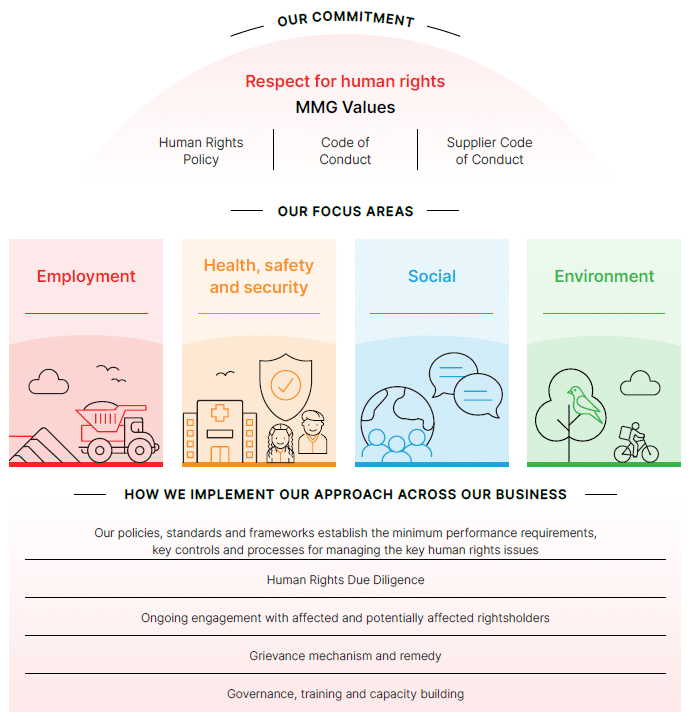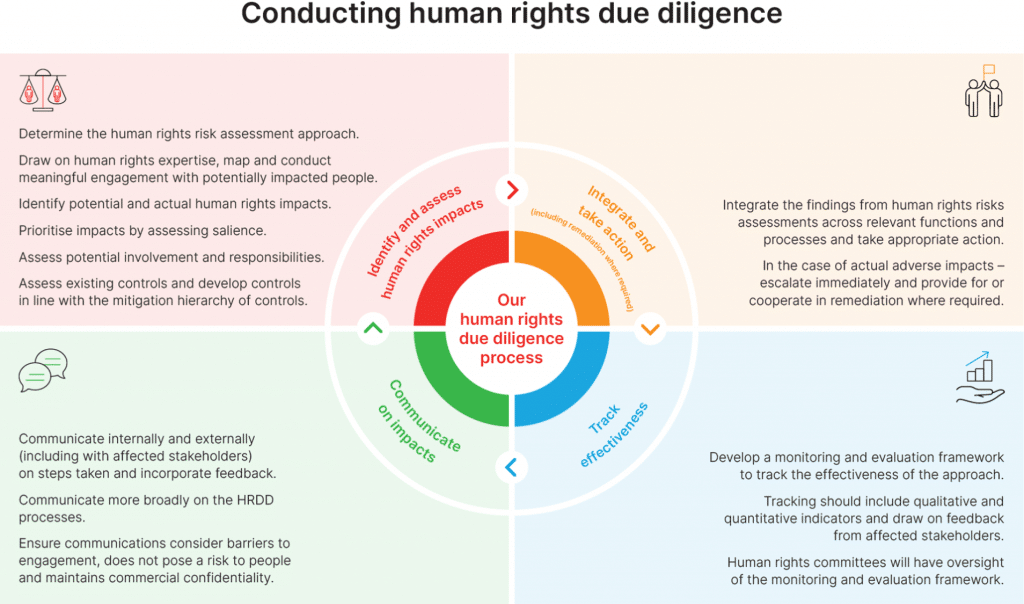Human Rights
MMG is committed to respecting and promoting human rights across all aspects of our operations and for all local communities and rightsholders. This includes our employees, contractors, supply chain workers, and the communities in which we operate. Our approach is grounded in internationally recognised standards and frameworks, including the UN Guiding Principles on Business and Human Rights, the UN Global Compact, the OECD Guidelines for Multinational Enterprises, the OECD Due Diligence Guidance for Responsible Supply Chains of Minerals from Conflict-Affected and High-Risk Areas, the Voluntary Principles on Security and Human Rights (VPSHR), the Global Industry Standard on Tailings Management (GISTM), and the ICMM Mining Principles.
Human rights oversight is embedded in our governance structure, with responsibilities shared across the Executive Code of Conduct and People Committee, and the Governance, Remuneration, Nomination and Sustainability (GRNS) Committee of the Board. These bodies oversee compliance with our Voluntary Principles Initiative (VPI) action plan, Modern Slavery Statement, and broader legislative obligations. Dedicated human rights working groups operate in Peru, the DRC, and Australia to support implementation and continuous improvement, and we are in the process of finalising the Botswana human rights working group. As we acquire assets, we work to embed these expectations across their operations and supply chain.

Our commitment to respect human rights is outlined in our Human Rights Policy and we integrate human rights considerations into our Code of Conduct, our Supplier Code of Conduct, policies, frameworks, standards, work quality requirements, processes, risk assessments, training and grievance mechanisms.
Human Rights Due Diligence
We conduct ongoing human rights due diligence to identify, prevent, mitigate, and account for risks and impacts. This includes site-level Human Rights Impact Assessments (HRIAs), stakeholder engagement, and salience mapping. In 2024, Las Bambas undertook a comprehensive HRIA in response to external allegations, while Kinsevere completed Responsible Minerals Initiative (RMI) assurance to support cobalt traceability.
Our Human Rights Due Diligence WQR ensures consistency across sites and is translated into Spanish, French, and Chinese to support global implementation.

Grievance Mechanisms
MMG provides accessible and effective grievance mechanisms, including our Whistleblower Service and site-specific procedures which are aligned with the UN Guiding Principles on Business and Human Rights. These allow stakeholders to report concerns confidentially and without fear of reprisal. In 2024, over 300 grievances were recorded and resolved across various categories, including employment, property damage, and environmental concerns. Notably, no grievances related to human rights were lodged in our stakeholder feedback portals.
Stakeholder Feedback Portal links can be accessed here:
We are committed to providing for or cooperating in remedy where we identify that we have caused or contributed to an adverse human rights impact and considering the role we may play in remediation where we are directly linked to an adverse human rights impact.
Voluntary Principles on Security and Human Rights
MMG has been a full member of the Voluntary Principles Initiative since May 2022. Our Security Management Plans incorporate VPSHR and the UN Basic Principles on the Use of Force and Firearms by Law Enforcement Officials. All private and public security providers are required to be signatories to or comply with the International Code of Conduct for Private Security Providers.
We recognise that many security incidents stem from unresolved community concerns. Our social performance teams work proactively to address these issues before they escalate. In 2024, we continued to engage with civil society and industry peers through ICMM forums and Peru’s National Society of Mining, Petroleum and Energy.
Employment and Labour Rights
MMG respects the labour rights of all workers, including those related to health and safety, non-discrimination, freedom of association, collective bargaining, fair wages, and reasonable working hours. We reject all forms of modern slavery and child labour. Our supply chain teams conduct regular risk assessments and require suppliers to complete questionnaires on human rights and modern slavery. These practices are outlined in our Modern Slavery Statement and Supplier Code of Conduct.
Health, Safety and Security
We are committed to the safe operation of our assets and the wellbeing of our people and communities. Our SSHE Performance Standard mandates environmental baseline studies and Life of Asset planning. Security-related human rights risks are managed in accordance with VPSHR, and our private security providers must comply with the International Code of Conduct for Private Security Providers.
Social Impacts
We aim to prevent and minimise adverse social impacts throughout the lifecycle of our operations. Our Social Performance Standard requires Social Baseline Studies and Social Impact and Opportunities Assessments (SIOAs) to be conducted at the start of operations and every five years or upon any material change. These assessments cover land access, resettlement, cultural heritage, and artisanal mining.
Environment and Climate Change
MMG recognises the link between environmental impacts and human rights. We manage risks related to closure, water stewardship, tailings, biodiversity, and pollution through our SSHE Performance Standard. Our climate strategy supports the global transition to a low-carbon economy and aligns with IFRS S2 and TCFD recommendations.
Responsible Mineral Production and Sourcing
In 2024, we strengthened our commitment to mineral transparency through the release of our Responsible Mineral Production and Sourcing Policy and disclosing our mineral resource contracts on our website.
We are committed to responsible mineral production and sourcing, upholding human rights, adhering to ethical business practices, protecting the environment, and promoting economic development. Our policy aligns with international guidelines and MMG’s internal frameworks. It addresses risks in conflict-affected and high-risk areas, such as human rights abuses and financial crimes, and outlines measures for due diligence, stakeholder collaboration, security, transparency, training, and grievance mechanisms.
Third Party Validation
MMG recognises that independent validation is essential to ensuring credibility, transparency, and continuous improvement in our human rights performance. We engage third-party experts and assurance providers to assess our policies, practices, and disclosures against international standards and stakeholder expectations.
In 2024, MMG commissioned external reviews of our Human Rights Due Diligence processes at Las Bambas and Kinsevere, including site-level Human Rights Impact Assessments (HRIAs) and salience mapping. These assessments were conducted in accordance with the UN Guiding Principles Reporting Framework and the OECD Due Diligence Guidance for Responsible Supply Chains of Minerals from Conflict-Affected and High-Risk Areas.
Our Responsible Minerals Initiative (RMI) assurance at Kinsevere supported cobalt traceability and compliance with global sourcing expectations. Additionally, MMG’s Modern Slavery Statement and Voluntary Principles Initiative (VPI) Annual Report were independently reviewed to confirm alignment with the Australian Modern Slavery Act and VPSHR commitments.
We also participate in ICMM’s peer learning and benchmarking exercises, which include third-party validation of member compliance with the ICMM Mining Principles and Performance Expectations. These reviews enable us identify gaps, share best practices, and refine our approach to human rights governance.
MMG’s Sustainability Report and associated disclosures are subject to limited assurance by an independent auditor, covering selected human rights indicators aligned with GRI 102, 412, 413, and 419. This assurance process enhances the reliability of our reporting and supports our commitment to transparency and accountability.